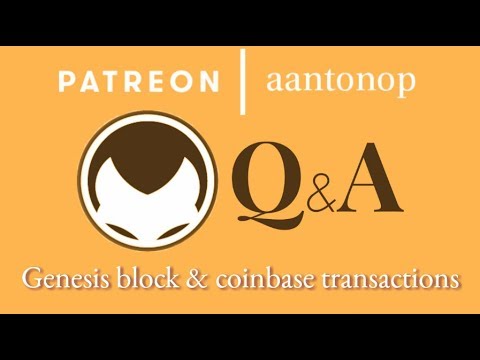How were the first bitcoins created? Who was mining in those early days? What is a coinbase transaction and how do miners integrate it within each block?
Genesis block code: https://github.com/bitcoinbook/bitcoinbook/blob/4bad0fb922c26c9088402aefe95cbf4276f2e334/code/satoshi-words.cpp
More on coinbase transactions: https://github.com/bitcoinbook/bitcoinbook/blob/f8b883dcd4e3d1b9adf40fed59b7e898fbd9241f/ch06.asciidoc
Note: “Coinbase” transactions should not be confused with the centralised California-based exchange, Coinbase Inc.
These questions are from the MOOC 9.2 session, which took place on February 23rd 2018. Andreas is a teaching fellow with the University of Nicosia. The first course in their Master of Science in Digital Currency degree, DFIN-511: Introduction to Digital Currencies, is offered for free as an open enrollment MOOC course to anyone interested in learning about the fundamental principles.
If you want early-access to talks and a chance to participate in the monthly live Q&As with Andreas, become a patron: https://www.patreon.com/aantonop
RELATED:
Consensus Algorithms, Blockchain Technology, and Bitcoin – https://youtu.be/fw3WkySh_Ho
Advanced Bitcoin Scripting Part 1: Transactions and Multisig – https://youtu.be/8FeAXjkmDcQ
What is Consensus: Rules without Rulers – https://youtu.be/2tqo7PX5Pyc
Forkology: A Study of Forks for Newbies – https://youtu.be/rpeceXY1QBM
Bitcoin: Where the Laws of Mathematics Prevail – https://youtu.be/HaJ1hvon0E0
Who is Satoshi Nakamoto? – https://youtu.be/1iEv-gUZNx4
Software distribution security – https://youtu.be/_V0vqy046YM
What is mining? – https://youtu.be/t4p4iMqmxbQ
Miners, pools, and consensus – https://youtu.be/JHz7LM4ncLw
The mining process – https://youtu.be/L4Xtau0YMJw
Nonces, mining, and quantum computing – https://youtu.be/d4xXJh677J0
The rules of Bitcoin (part 1) – https://youtu.be/VnQu4uylfOs
The rules of Bitcoin (part 2) – https://youtu.be/vtIp0GP4w1E
Rules versus rulers – https://youtu.be/9EEluhC9SxE
The value of proof-of-work – https://youtu.be/ZDGliHwstM8
Could a state-sponsored 51% attack work? – https://youtu.be/KUd8ZGgm6Qo
Honest nodes and consensus – https://youtu.be/KAhY2ymI-tg
Spam transactions and Child Pays For Parent (CPFP) – https://youtu.be/t3c0E4fkSNs
Is Bitcoin a democracy? – https://youtu.be/TC3Hq76UT5g
Decentralized power, leaderless governance – https://youtu.be/E5VbDlQTPzU
Scaling, trust, and trade-offs – https://youtu.be/vCxmHwqyJWU
What is the role of nodes? – https://youtu.be/fNk7nYxTOyQ
Why running a node is important – https://youtu.be/oX0Yrv-6jVs
Lightning, full nodes, and miners – https://youtu.be/dlJG4OHdJzs
Running nodes and payment channels – https://youtu.be/ndcfBfE_yoY
What happens during a fork? – https://youtu.be/XBk8hBJ1xVo
SegWit adoption – https://youtu.be/KCsTVTRk6I4
Spam transactions and Child Pays For Parent (CPFP) – https://youtu.be/t3c0E4fkSNs
Energy consumption – https://youtu.be/2T0OUIW89II
Solar energy and mining in space – https://youtu.be/cusakcpa8AM
Bitmain and ASICBoost allegations – https://youtu.be/t6jJDD2Aj8k
Andreas M. Antonopoulos is a technologist and serial entrepreneur who has become one of the most well-known and respected figures in bitcoin.
Follow on Twitter: @aantonop https://twitter.com/aantonop
Website: https://antonopoulos.com/
He is the author of two books: “Mastering Bitcoin,” published by O’Reilly Media and considered the best technical guide to bitcoin; “The Internet of Money,” a book about why bitcoin matters.
THE INTERNET OF MONEY, v1: https://www.amazon.co.uk/Internet-Money-collection-Andreas-Antonopoulos/dp/1537000454/ref=asap_bc?ie=UTF8
[NEW] THE INTERNET OF MONEY, v2: https://www.amazon.com/Internet-Money-Andreas-M-Antonopoulos/dp/194791006X/ref=asap_bc?ie=UTF8
MASTERING BITCOIN: https://www.amazon.co.uk/Mastering-Bitcoin-Unlocking-Digital-Cryptocurrencies/dp/1449374042
[NEW] MASTERING BITCOIN, 2nd Edition: https://www.amazon.com/Mastering-Bitcoin-Programming-Open-Blockchain/dp/1491954388
Subscribe to the channel to learn more about Bitcoin & open blockchains!
Music: “Unbounded” by Orfan (https://www.facebook.com/Orfan/)
Outro Graphics: Phneep (http://www.phneep.com/)
Outro Art: Rock Barcellos (http://www.rockincomics.com.br/)
source











Who is sending all of the small transactions to his address in the Genesis block I don't understand there has already been 16 Bitcoins transferred to that address from random other addresses
why a miner cannot put more than 1 payment to themself? or a bigger check in 1 transaction?
has coinbase got segwit now?
As of May 2018, can a newbie start a home-based mining operation and actually mine coins? If yes, would you share your thoughts on how many coins mined per day/wk? Thank you!
How about bitcoins generated by orphaned blocks ? Are they destroyed from the system as soon as orphaned block is rejected ?
How many addresses can be linked to a mnemonic seed?
It would be a good idea to qualify "coinbase" not to be confused with a centralised exchange. This will aid new people to understand what is actually being conveyed.
why dont u post ur whole talks on this channel?
like the Andreas Antonopoulos Panamchain – 2018?
????
01.03.2009 NYT "chancelor on brink of second bailout for banks"
?♂️Bless your heart man?
"Septillions" bon mot!
If miners write the check to themselves, does this means you need to have funds available in order to start mining? how can someone with no coin start mining?
FYI coinbase = the freshly mined coins